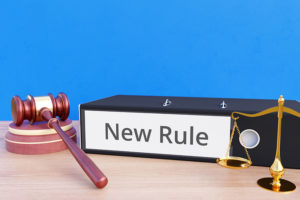DOL Issues Final Rule Narrowing Circumstances for Finding Joint Employer Relationships
 The U.S. Department of Labor (DOL) issued its long-anticipated Final Rule on the topic of joint employment on January 12, 2020, dramatically limiting the number of situations in which it will find companies to be “joint employers” equally responsible for a worker’s wages and overtime pay required by the Fair Labor Standards Act (FLSA).
The U.S. Department of Labor (DOL) issued its long-anticipated Final Rule on the topic of joint employment on January 12, 2020, dramatically limiting the number of situations in which it will find companies to be “joint employers” equally responsible for a worker’s wages and overtime pay required by the Fair Labor Standards Act (FLSA).
The rule “provides updated guidance for determining joint employer status when an employee performs work for his or her employer that simultaneously benefits another individual or entity,” such as is the case in franchisor-franchisee relationships or for companies that outsource or contract workers for various services. Effective March 16, 2020, the new rule is the first significant change to the joint employer criteria since the 1950s.
The New Rule Will Reduce Number of Joint Employer Relationships
Liability for failing to pay minimum wage or overtime pay rests on whether the “employer” is an individual or entity that acts “directly or indirectly in the interest of an employer in relation to an employee[.]” Under the FLSA, an employee may have one or more joint employers, defined as any employer that is jointly and severally liable with another employer for the employee’s FLSA-mandated wages and overtime pay.
The Final Rule establishes a four-part test for determining joint employer status and represents a reversal of Obama administration policies that would have broadened joint employer liability.
A New Joint Employer Test
Under the test outlined in the Final Rule, in situations where an employee performs work for an employer that simultaneously benefits another individual or entity, that individual or entity may be considered a joint employer if it “actually exercises” the power to:
- Hire or fire the employee;
- Supervise and control the employee’s work schedules or conditions of employment;
- Determine the employee’s rate and method of payment; and
- Maintain the employee’s employment records.
Under the rule, the DOL can look at additional factors to determine whether another person is a joint employer, “but only when they show whether the potential joint employer is exercising significant control over the terms and conditions of the employee’s work.”
Factors NOT Relevant to Joint Employer Determination
In addition to establishing the elements that it will use in its joint employer determinations, the DOL also sets forth several other factors that it deems not relevant to the analysis.
Not only will the DOL disregard an employee’s “economic dependence” on a potential joint employer in its deliberations, but the rule also states that the following “do not make joint employer status more or less likely under” the FLSA:
- Operating as a franchisor or entering into a brand and supply agreement, or using a similar business model;
- The potential joint employer’s contractual agreements with the employer requiring the employer to comply with its legal obligations or to meet certain standards to protect the health or safety of its employees or the public;
- The potential joint employer’s contractual agreements with the employer requiring quality control standards to ensure the consistent quality of the work product, brand, or business reputation; and
- The potential joint employer’s practice of providing the employer with a sample employee handbook, or other forms, allowing the employer to operate a business on its premises (including “store within a store” arrangements), offering an association health plan or association retirement plan to the employer or participating in such a plan with the employer, jointly participating in an apprenticeship program with the employer, or any other similar business practice.
Speak With a Michigan Employment Law Attorney About Your Joint Employer Questions
If you have questions or concerns about the new Final Rule and your company’s potential obligations as a joint employer, the employment law attorneys at Kreis Enderle can provide you with sound, straightforward counsel to guide your decision-making.